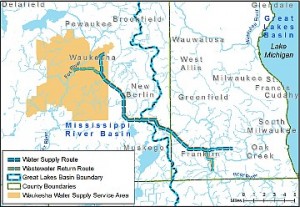A Rejuvenated Navigational Servitude?
As a general rule, within its borders each individual state holds title to the beds of water bodies that were navigable at the time of its statehood, and has jurisdiction to regulate activity upon those waters.[1] State authority over navigable waters is not absolute, however; in a previous post, for example, I discussed the limits imposed by the public trust doctrine. The “navigational servitude” is another important constraint on state power. It flows from the Commerce Clause and asserts “the paramount power of the United States to control [navigable] waters for purposes of navigation in interstate and foreign commerce.”[2] This power justifies, for example, the acquisition and holding of private lands “to deepen the water . . . or to use them for any structure which the interest of navigation, in [the government’s] judgment, may require.”[3] When validly exercised, the navigational servitude excuses the federal government even from the Fifth Amendment’s Takings Clause, because “the damage sustained does not result from taking property from riparian owners within the meaning of the Fifth Amendment but from the lawful exercise of a power to which the interests of riparian owners have always been subject.”[4] Today, however, the navigational servitude has largely retreated into obscurity. It is often viewed as a relic from a bygone era when rivers were the nation’s primary mode of commerce and long-distance travel.
 The advent of emerging technologies that will make water travel more attractive may catapult the navigational servitude to renewed prominence. In the not-too-distant future, transformational technologies like hovercraft and airships may become common modes of commercial and public travel over navigable waters. Integrating the resulting water-based activity into our legal and social systems would require involvement at all levels of governance, including the courts. In fact, a fascinating example of a related dispute has already reached the United States Supreme Court.
The advent of emerging technologies that will make water travel more attractive may catapult the navigational servitude to renewed prominence. In the not-too-distant future, transformational technologies like hovercraft and airships may become common modes of commercial and public travel over navigable waters. Integrating the resulting water-based activity into our legal and social systems would require involvement at all levels of governance, including the courts. In fact, a fascinating example of a related dispute has already reached the United States Supreme Court.


